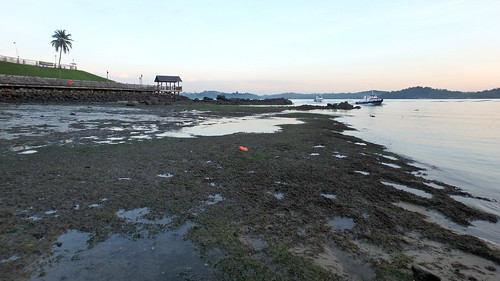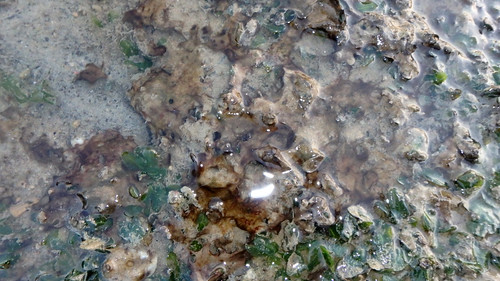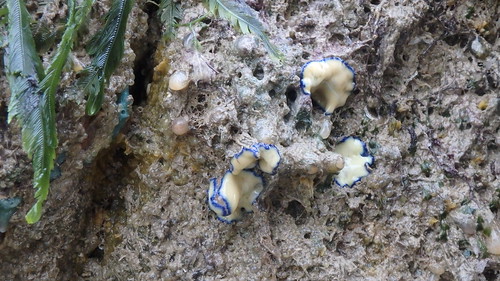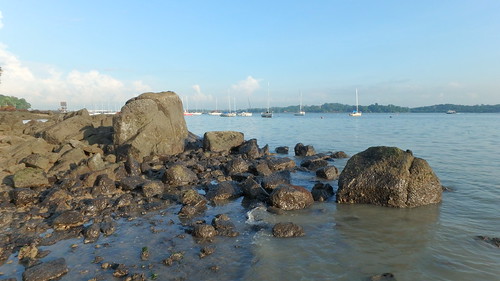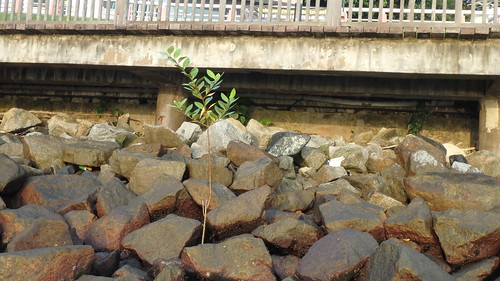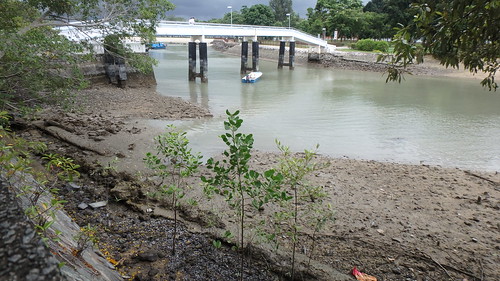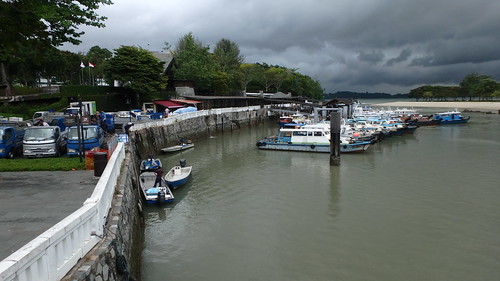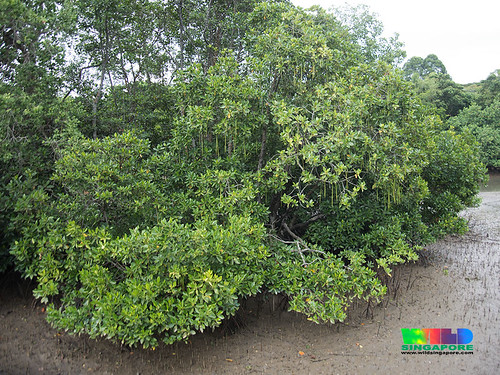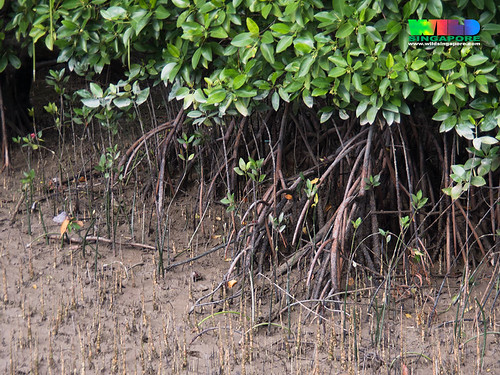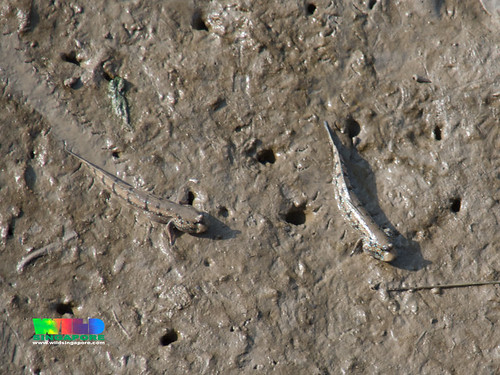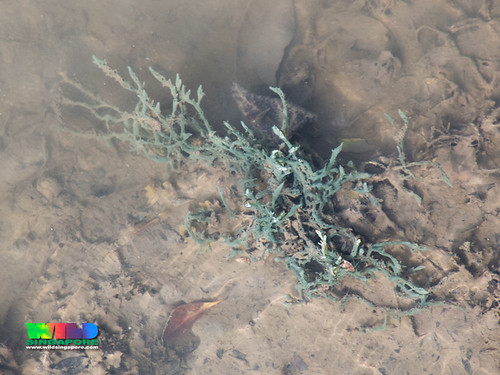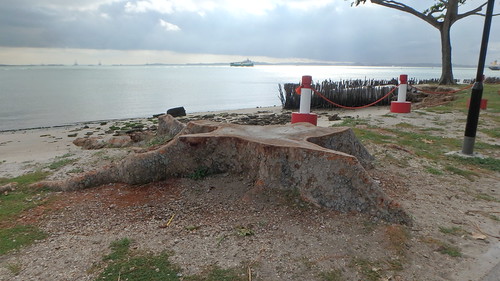The seagrasses appear fine, I saw some of the usual animals, although the shore is less lively than usual. I also checked out Changi Creek, the mangroves up the Creek and shores at Carpark 3. I did not see any signs of massive oil spill impact.
The meadows were all Spoon seagrass, mostly fresh and green, although some were covered in epiphytes. There were patches of scum on some of the seagrasses. Also, in small patches, filamentous hairy black stuff (Cyanobacteria?) on seagrasses and rocks.
As usual, there were lots of sea cucumbers. The seagrasses were dotted with small Warty pink sea cucumbers. I saw a few Orange sea cucumbers. But I didn't see any Thorny sea cucumbers. The sand bar was dotted with buried Ball sea cucumbers, and I also saw some washed up above ground. I also saw one small Garlic bread sea cucumber.
I saw one small Biscuit sea star, one Hairy sea hare and a long Pink ribbon worm. There were also large patches of Gregarious tubeworms, forming a shaggy carpet on the low water mark. And some Solitary tubeworms too. The presence of delicate burrowing animals suggest the ground is alright.
I saw two Cerianthids in the seagrass meadows, both with Phoronid worms. Colin spotted one Sea pencil. On the rocky shores I saw one small Pink flowery soft corals, a few small sea fans. There were some small patches of Zebra coral. Button zoanthids still dominated one corner of the bay.
The rocks were still lively at the high water mark. Some had patches of Little black nesting mussels dotted with Lined bead anemones. There were many Drills and clusters of them were laying eggs. There were many Banded bead anemones and I saw some Onch slugs. There were also many Thumbs-up sea squirts and Yellow clustered bead ascidians.
Today, I saw many tiny Blue-dotted flatworms, some in clusters.
On the rocks were many plants and animals include clumps of Round sea grape seaweeds. And patches of sponges and corals.
The most abundant sponge on the rocky shore remains the Melted chocolate sponge.
There were many clumps of blue Elegant sponge. For the first time since the oil spill, I saw a few Purple branching sponges, usually the most abundant sponge on this shore.
The little mangrove sapling on the seawall that was somewhat oiled, seems fine now!
Sadly, as usual, there remained a line of plastic litter along the mid-water mark. Many were coated in oil and this will remain a source of oil pollution until they are removed. Although this beach is cleaned everyday, only the high tide line is cleaned.
After the tide turned, I headed out to check Changi Creek itself. There are several large mangrove saplings growing near the seawall. The mudflats and seawall looks normal and I didn't see any signs of sheen. Although there is still the stain of oil on the drain wall.
A boom has been retied across the drain. Another boom near the bridge is still there (!). There is some dead vegetation near the bridge.
There is a 'jetty' next to the Ferry Terminal. This 'jetty' is still well used by fish farmers. It was very busy as the tide was coming in.
I headed upstream to the mangroves at Changi Creek. The mangroves looked alright. No massive yellowing leaves or bare branches.
Most of the Bakau kurap trees were producing propagules that were nice and long. I didn't see any propagules with odd colours.
I also saw some saplings under the big mangrove trees.
I saw two Blue-spotted mudskippers and many small fishes swimming in the water. But I didn't see any Giant mudskippers.
Some parts of the mud stream banks had Leaf oysters that seemed alive.
I also saw a large clump of blue Elegant sponge growing in the middle of the Creek next to the mud flats.
At Changi Beach near Carpark 3, the oiled stakes and geobags are still there and still falling apart. In fact, one of the large trees next to the beach had been cut down as it was probably a danger to the public as its roots were severely eroded.
It's a relief to see the shores did not seem too badly affected by the oil spill so far.
Posts about the Jan 2017 Johor Strait oil spill
- Survey on 15 May, five months after the oil spill
- Survey on 27 Apr, four months after the oil spill
- Survey on 31 May, three months after the oil spill
- Survey on 13 Mar, two months after the oil spill
- Changi Creek
- Changi Creek mangroves
- Changi Beach at Carpark 2 and 3
- Changi seagrass meadows near Changi Point Ferry Terminal
- Round Ubin survey for oil spill impact and long-term monitoring
- Changi Creek and Sungei Ubin after the oil spill
- Oil spill at East Johor Strait: YOUR sightings part 2
- Changi Creek
- Changi Creek mangroves
- Changi Beach at Carpark 1 and 2
- Changi seagrass meadows near Changi Point Ferry Terminal
- How are Pasir Ris mangroves and seagrass meadows after the oil spill?
- Are we helping or harming when we 'clean' oiled mangroves?
- Oil spill at East Johor Strait: YOUR sightings
- Key happenings: Oil spill at East Johor Strait, Jan 2017
- Survey of oil spill spill impact on Ubin and mainland Singapore, 5 Jan 2017
- Oil spill near Pulau Ubin, 4 Jan 2017

